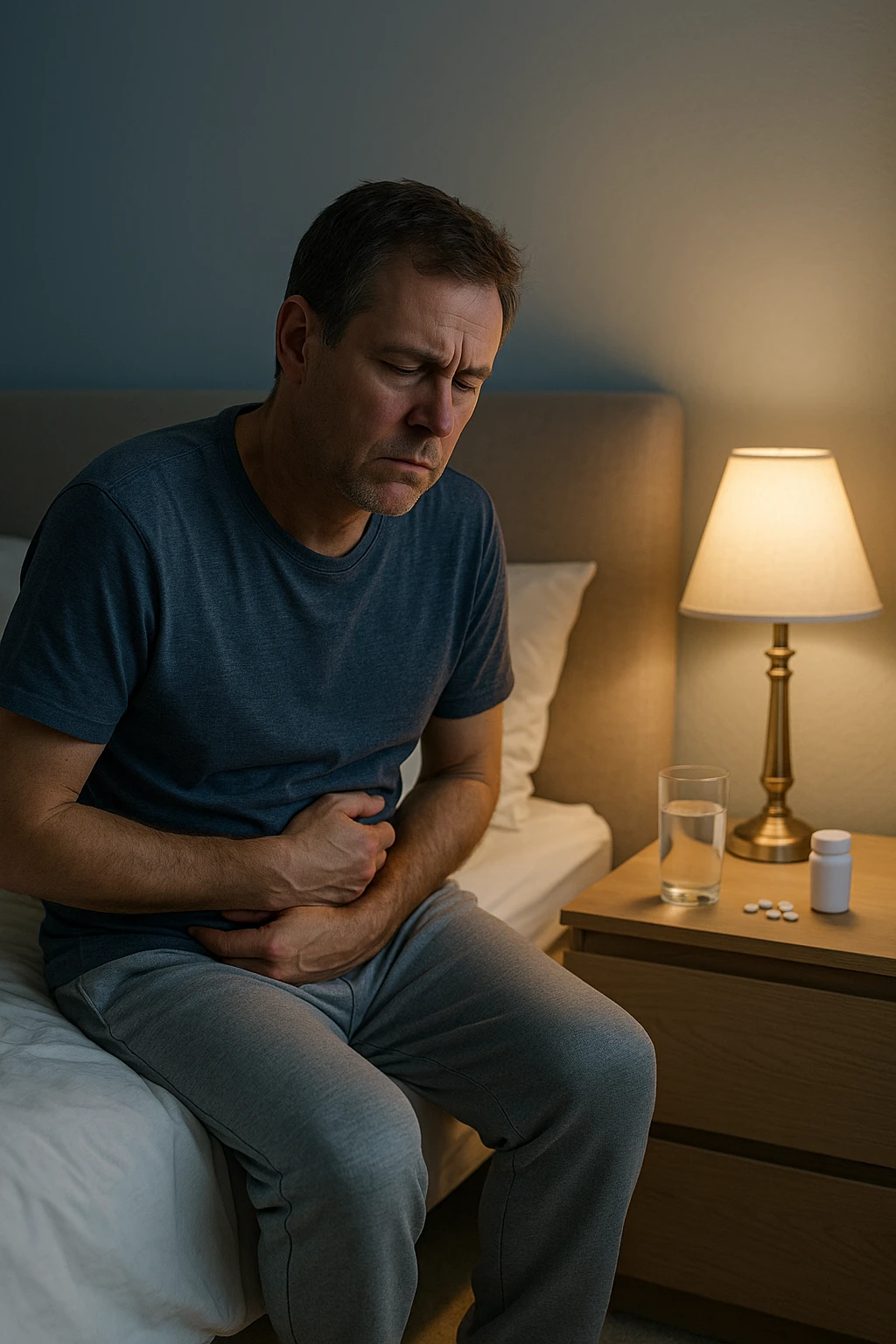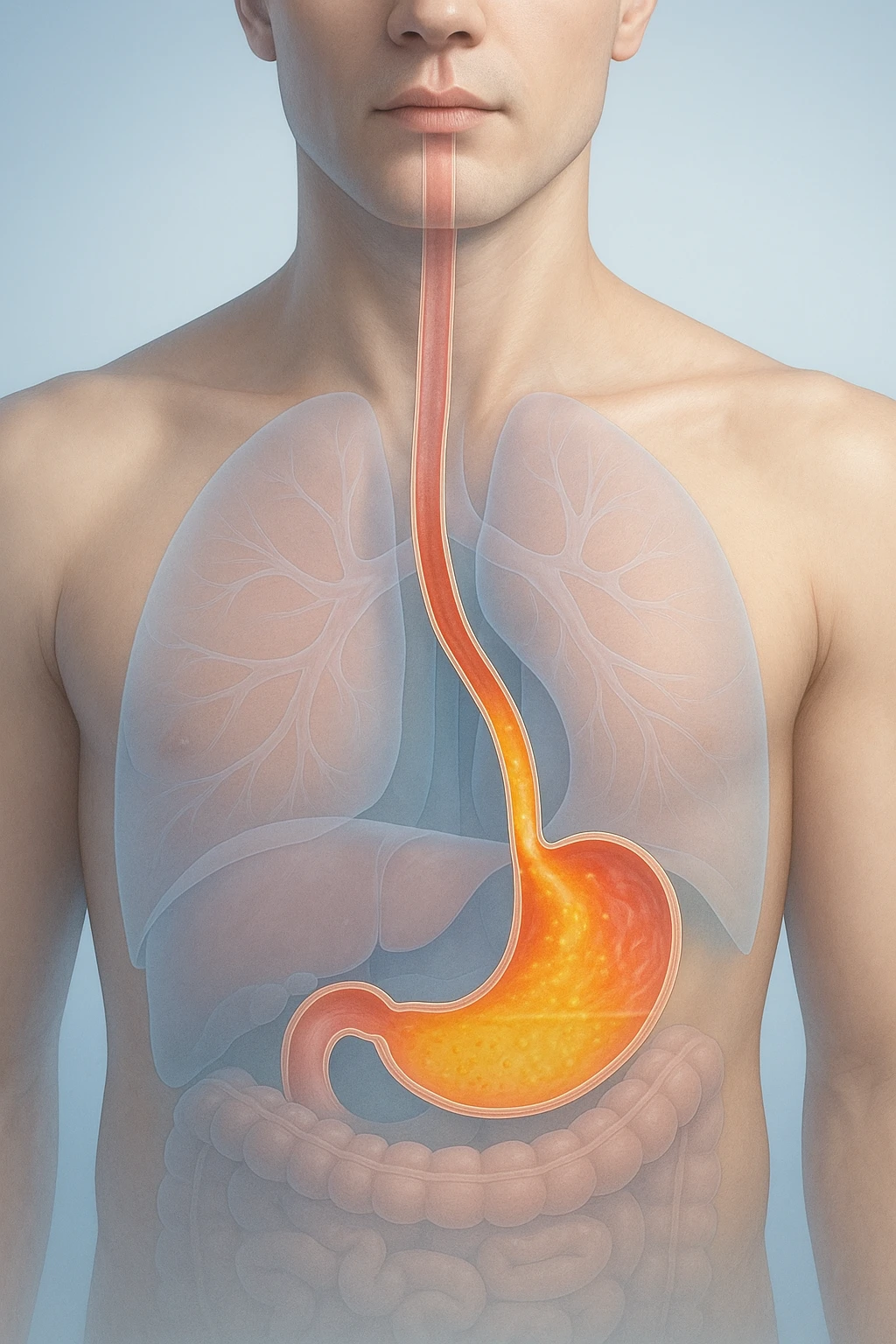Diarrhea at Night Explained: Symptoms, Risks, and Prevention
When Diarrhea at Night Interrupts Sleep
What It Means
Diarrhea at night, also known as nocturnal diarrhea, refers to loose or watery bowel movements that occur during sleep and are severe enough to wake a person. Unlike mild stomach upset after a large or spicy meal, nocturnal diarrhea tends to be more persistent and can interfere with restful sleep. Because these episodes happen while the body is fasting, they often suggest that the bowel is releasing fluid independent of food intake.
- Occurs during sleep and may wake the person.
- Persists beyond ordinary digestive reactions.
- May signal abnormal bowel activity or secretion.
Recognizing this difference is important. Ordinary digestive reactions usually settle as food is digested, while diarrhea that continues through the night may indicate that something more complex is affecting the intestinal tract.
Why It Deserves Attention
When diarrhea wakes a person from sleep, it can be a clue that the digestive system is reacting to an underlying condition rather than a short-term dietary issue. Normally, bowel activity slows during sleep. If stools remain loose or frequent overnight, this means the intestines are active even when the body is at rest. In some people, this pattern may point to inflammation or abnormal secretion of fluids within the gut.
Key point: A single episode is usually not serious, but repeated diarrhea at night should be discussed with a healthcare provider to prevent dehydration and uncover possible chronic bowel disorders.
How Often It Occurs
Chronic diarrhea affects about five percent of adults, making it a relatively common gastrointestinal concern. Within this group, nocturnal diarrhea is less frequent but still notable. Studies show that roughly one-third of people with microscopic colitis, a form of inflammation of the colon, experience stools during the night.
| Condition | Approximate Prevalence |
|---|---|
| Chronic diarrhea (general) | ~5% of adults |
| Nocturnal diarrhea in microscopic colitis | ~33% of patients |
While most individuals will never experience persistent diarrhea at night, its presence is meaningful because it helps doctors distinguish between temporary digestive upset and medical conditions that require further evaluation.
Underlying Mechanisms of Nocturnal Diarrhea
Secretory Causes
Secretory diarrhea occurs when the intestines release more water and electrolytes into the bowel than the body can absorb. This process can continue even when a person is not eating or drinking, which is why it may cause diarrhea during sleep or fasting. The stools are often large in volume and watery, reflecting the ongoing secretion of fluid within the gut. This type of diarrhea can occur in conditions that affect how the intestines regulate salt and fluid movement, leading to persistent bowel activity regardless of meals or rest.
- Continues during fasting or sleep
- Produces large-volume, watery stools
- Linked to abnormal secretion of fluids in the gut
Because secretory diarrhea continues through sleep, it tends to be one of the more noticeable forms of nocturnal diarrhea. Recognizing this pattern helps doctors differentiate it from causes that are more diet-related or temporary.
Osmotic and Inflammatory Patterns
In osmotic diarrhea, substances in the intestine draw water into the bowel, leading to loose stools. This often happens after consuming poorly absorbed foods or drinks, such as certain sweeteners or lactose. Unlike secretory diarrhea, osmotic types usually improve when fasting or avoiding the triggering substance, helping identify them as diet-related or functional.
Inflammatory diarrhea, on the other hand, stems from irritation or damage to the intestinal lining. Inflammation can cause mucus, blood, and fluid to pass into the stool, sometimes continuing even at night. When the intestinal wall is inflamed, as in some chronic bowel diseases, the colon remains active around the clock, which explains why symptoms may interrupt sleep.
| Type | Typical Behavior | Response to Fasting | Common Cause |
|---|---|---|---|
| Secretory | Watery, large-volume stools even at night | Persists during fasting | Abnormal fluid secretion |
| Osmotic | Loose stools after certain foods | Improves with fasting | Poorly absorbed substances |
| Inflammatory | May include mucus or blood, sometimes nocturnal | May persist despite fasting | Intestinal inflammation |
Functional vs. Organic Differences
Some bowel problems, such as irritable bowel syndrome (IBS), are considered functional because the intestines appear normal under a microscope but behave abnormally. In these cases, symptoms are usually linked to stress, food intake, or hormonal changes and typically subside during rest or fasting.
By contrast, organic causes-like inflammatory or secretory disorders-stem from measurable changes in tissue or function that persist independently of food or stress. When diarrhea occurs at night, it often suggests an organic process rather than a functional one. Understanding these mechanisms helps explain why night-time symptoms warrant careful evaluation and medical follow-up.
Common Medical Causes and Warning Signs
Inflammatory Bowel Disease (IBD)
Inflammatory bowel disease, which includes Crohn’s disease and ulcerative colitis, is a major cause of nocturnal diarrhea. In these conditions, inflammation damages the intestinal lining, disrupting how the bowel absorbs water and nutrients. This irritation often causes the colon to stay active even at night, leading to urgent, loose stools that may wake a person. Some people may also notice blood or mucus in their stool and experience abdominal discomfort or fatigue over time.
- Occurs both day and night due to continuous inflammation
- May include blood, mucus, or abdominal discomfort
- Often associated with fatigue and unintended weight loss
Because inflammation is continuous, symptoms do not subside during rest or fasting. This persistent pattern helps doctors distinguish IBD from functional bowel problems that tend to improve when digestion slows.
Microscopic Colitis
Microscopic colitis is another important cause of nocturnal diarrhea, especially in adults. Although the colon often appears normal during colonoscopy, tissue biopsies reveal inflammation under the microscope. This inflammation leads to watery, secretory diarrhea that can occur both day and night, regardless of eating or fasting. Because symptoms overlap with other bowel conditions, microscopic colitis may be overlooked without proper testing.
| Aspect | Typical Finding |
|---|---|
| Colonoscopy appearance | Usually normal |
| Diagnosis method | Tissue biopsy under microscope |
| Common symptom | Chronic watery diarrhea, often nocturnal |
Recognizing this condition is important because it is treatable once identified. People affected may notice chronic watery stools, urgency, and occasional bloating, even when standard imaging appears normal.
Other Causes and Red Flags
While inflammatory and microscopic colitis are common explanations, other factors can contribute to diarrhea at night. Some medications-such as certain antibiotics, acid-suppressing drugs, or laxatives-can stimulate the bowel. Hormonal disorders and some infections may also increase fluid secretion in the intestines, resulting in secretory diarrhea that persists during sleep.
Functional bowel disorders such as IBS typically do not cause true nocturnal symptoms. Therefore, diarrhea that occurs at night or continues during fasting is considered an alarm feature that warrants medical evaluation. Seek care if diarrhea is accompanied by any of the following warning signs:
- Blood or dark, tarry stool
- Unintentional weight loss
- Ongoing diarrhea that disrupts sleep
- Signs of dehydration, such as dizziness or reduced urination
- Persistent symptoms lasting more than a few days
These features help differentiate temporary digestive upsets from conditions that require medical attention. Prompt evaluation allows for early treatment and helps prevent complications from chronic fluid loss or inflammation.
How Doctors Diagnose the Cause
Initial Evaluation
When diarrhea at night becomes persistent, doctors begin by collecting a detailed medical history and performing a physical examination. This first step helps identify patterns such as duration, frequency, diet, medications, and symptoms like weight loss or blood in the stool. These details can narrow down whether the cause is likely functional, inflammatory, or related to another condition.
- Comprehensive medical history and physical examination
- Stool studies to check for infection or inflammation
- Blood tests for anemia, thyroid, and electrolyte balance
- Review of medications and dietary habits
Basic laboratory tests and stool studies are commonly ordered. These can detect infection, inflammation, or poor nutrient absorption. Blood work may also rule out anemia, electrolyte imbalances, or thyroid issues. Together, these early tests guide doctors toward the most probable diagnosis and determine if further evaluation is needed.
Advanced Testing
If initial findings or symptoms suggest an underlying disorder, further tests may be recommended. Endoscopy, such as colonoscopy, allows doctors to visually examine the colon lining and take tissue samples, known as biopsies. This step is especially important when alarm features-like blood in the stool or unexplained weight loss-are present or when microscopic colitis is suspected.
| Test | Purpose | What It Reveals |
|---|---|---|
| Stool Analysis | Detect infection, blood, or inflammation | Identifies bacterial or inflammatory causes |
| Blood Tests | Evaluate general health and organ function | Shows anemia, thyroid, or metabolic issues |
| Colonoscopy | Visual inspection of the colon | Detects structural or inflammatory disease |
| Biopsy | Microscopic tissue examination | Confirms microscopic colitis or hidden inflammation |
In microscopic colitis, the colon can appear normal during colonoscopy. Because of this, a mucosal biopsy is required to detect the subtle inflammation that confirms diagnosis. These advanced tests ensure that less obvious but clinically important causes of nocturnal diarrhea are not missed.
What Results Reveal
The goal of diagnostic testing is to move from uncertainty to a clear, evidence-based explanation for the symptoms. Identifying the underlying cause-whether inflammatory, secretory, or medication-related-allows doctors to tailor treatment effectively. For most people, this process provides reassurance that the cause can be managed once understood.
- What tests will help determine the cause of my symptoms?
- Do my results suggest inflammation or another condition?
- Should I have a colonoscopy or other imaging tests?
- What lifestyle or medication factors might contribute?
- How will treatment depend on what these tests show?
Managing and Preventing Diarrhea at Night
Medical Treatment
The first step in managing diarrhea at night is to identify and treat the underlying cause. Because nocturnal symptoms often point to an organic condition, treatment may include specific medications targeted to the diagnosis. For example, in microscopic colitis, a standard therapy is budesonide, which reduces inflammation in the colon and helps restore normal bowel function. Other causes, such as infection or inflammation, may require different medical approaches based on test results.
Typical treatment steps may include:
- Addressing the specific underlying condition once identified
- Using targeted medication such as budesonide for microscopic colitis
- Adjusting or reviewing medications that may worsen diarrhea
- Following up with the healthcare provider to monitor response
Doctors may also adjust medications that contribute to diarrhea or recommend temporary dietary modifications while treatment takes effect. Following the treatment plan closely and attending follow-up appointments help ensure that symptoms improve and the condition remains well controlled.
Home Care and Hydration
Hydration is one of the most important aspects of managing any type of diarrhea. Each loose stool causes fluid and electrolyte loss, which can lead to dehydration, particularly in children and older adults. Drinking water, oral rehydration solutions, or clear broths can help replace what is lost and maintain balance. During recovery, gentle foods such as bananas, rice, applesauce, and toast may be better tolerated than high-fat or spicy meals.
Helpful home-care reminders:
- Drink water or oral rehydration fluids frequently
- Choose mild, low-fat foods during recovery
- Rest and allow the digestive system to recover
- Seek medical advice if dehydration or prolonged symptoms occur
Resting and keeping track of symptoms can also support healing. If diarrhea continues for several nights or is accompanied by weakness, dizziness, or signs of dehydration, it’s important to contact a healthcare professional promptly. Timely evaluation helps prevent complications and supports faster recovery.
Preventive Habits
Once symptoms have resolved, prevention focuses on maintaining a balanced digestive routine. Identifying and avoiding dietary triggers-such as certain artificial sweeteners, caffeine, or foods that previously caused discomfort-can help reduce recurrence. Eating regular meals, staying hydrated, and avoiding eating too close to bedtime may also minimize episodes of diarrhea at night.
Healthy habits for prevention:
- Identify and avoid food or drink triggers
- Stay consistently hydrated throughout the day
- Maintain a balanced, fiber-rich diet
- Avoid late heavy meals or excessive caffeine before bedtime
- Consult a doctor if symptoms or alarm signs persist
Persistent nocturnal diarrhea or symptoms that occur alongside warning signs such as blood in the stool, weight loss, or ongoing fatigue should always prompt medical evaluation. Early diagnosis allows for effective treatment and reassurance, helping both parents and patients maintain confidence in managing their digestive health.
Frequently Asked Questions About Diarrhea at Night
- Is diarrhea at night always a sign of illness?
- Not always. Occasional nighttime diarrhea may follow dietary upset, but frequent or persistent episodes often suggest an underlying medical condition that needs evaluation.
- Why does diarrhea wake me up from sleep?
- When the intestines stay active during rest, excess fluid or inflammation in the bowel can trigger urgent movements that interrupt sleep.
- Can stress or anxiety cause diarrhea at night?
- Stress can worsen bowel sensitivity, but true nocturnal diarrhea is more likely linked to organic causes, such as inflammation or abnormal fluid secretion.
- What medical conditions are linked to nighttime diarrhea?
- Common causes include inflammatory bowel disease, microscopic colitis, infections, and certain medications that affect bowel activity or fluid balance.
- How do doctors diagnose the cause of nocturnal diarrhea?
- Evaluation typically includes a medical history, stool and blood tests, and sometimes colonoscopy with biopsy to detect conditions like microscopic colitis or inflammation.
- When should I see a doctor about diarrhea that happens at night?
- Seek medical care if diarrhea lasts several days, occurs with blood, weight loss, or fatigue, or continues despite dietary changes and fasting.
- Can hydration really help during nocturnal diarrhea?
- Yes. Replacing fluids and electrolytes lost through frequent stools helps prevent dehydration and supports recovery, especially in children and older adults.
- Does what I eat before bedtime affect diarrhea at night?
- For some people, late heavy meals, caffeine, or foods containing artificial sweeteners may trigger symptoms. Eating earlier and choosing gentle foods can help reduce episodes.
- Is nighttime diarrhea related to irritable bowel syndrome (IBS)?
- IBS symptoms usually ease during rest, so true nocturnal diarrhea is uncommon with IBS and may indicate another underlying condition requiring assessment.
- How can I prevent diarrhea from disturbing my sleep?
- Maintaining a balanced diet, identifying triggers, staying hydrated, and managing medications under medical guidance can help prevent recurrences of diarrhea at night.













